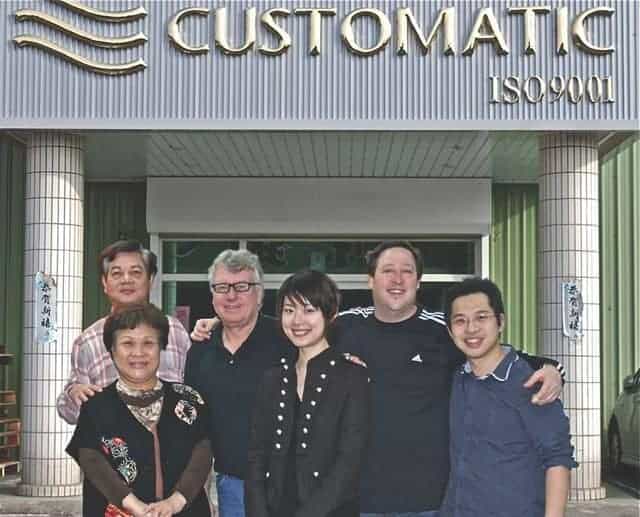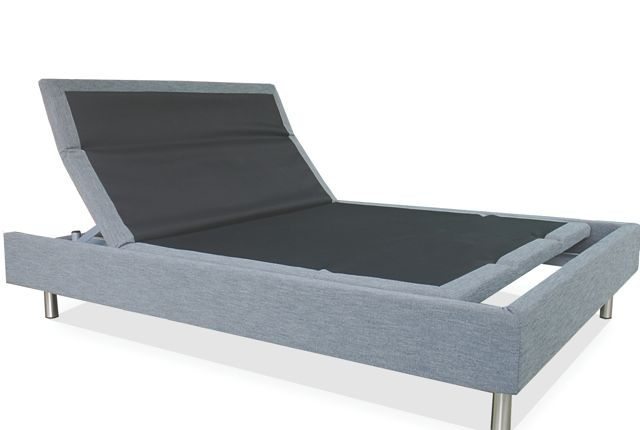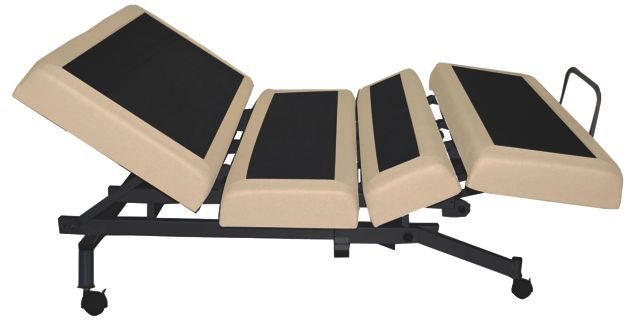Bedding industry execs create innovative, value-priced products
BY DOROTHY WHITCOMB

Customatic employees, left to right: Lung Tan Shih, head of production; Sophia Shih, head of office management; Phil McCarty; Melody Liu-Shih, head of logistics; Phil Sherman; Jack Shih, partner and head of marketing & product development.
Customatic Adjustable Bedz is a young company driven by the professional expertise of two bedding industry veterans who have committed themselves to offering innovative, value-priced products to the rapidly expanding adjustable bed market. Co-founded in 2010 by Phil McCarty and Phil Sherman, the Natick, Massachusetts-based company has grown rapidly by harnessing the technical and manufacturing expertise of its Taichung, Taiwan-based partner, Jack Shih, to their own deep understanding of the bedding industry.
McCarty began his career in 1972 as an operations manager for Waterrest Waterbeds, a well-regarded specialty sleep store during that period. He moved to the manufacturing side of the industry in 1976, and in 1982 became an independent sales representative for a number of major sleep products manufacturers.

The Nova features a modern style with grey flannel fabric, underbed LED nightlight navigation feature and an inner deck design.
Sherman entered the industry in 1985, when he became a marketing director and then vice president of marketing at Sleepy’s, the 800-unit bedding retail chain. His career also included a stint at Hillside Bedding, where he was instrumental in moving the company from Chapter 11 bankruptcy filing into a successful public offering. After spending two years at Somma Mattress, Sherman moved to Boyd Specialty Sleep, where he served as national vice president of sales and marketing for 10 years.
McCarty and Sherman met through Boyd. As their professional and personal relationship grew, they began to understand that there were synergies in their skills and perspectives that could be applied to emerging opportunities in the adjustable bed arena.
“We wanted to build a better mousetrap (and create) a stronger value house that came to market with a step-up story that included a number of models,” explains McCarty.
“It’s far more efficient to build two styles rather than 14, but because we have so many choices, we’re able to sell multiple retailers within the same region,” he continues.
If the pair’s strategy regarding product is to go deep, its management strategy is quite the opposite.
Sherman explains: “We’re a very lean company with no excess management, which means that we’re able to provide the best quality product at the best price.”
The partners add that until recently they also chose “to fly under the radar” but have decided that the time has come “to take credit where credit is due.”
Currently, Customatic has close to 300 accounts on its ledger. Customers include A- and B-tier manufacturers, specialty sleep chains, furniture retailers and department stores in the United States, Canada, Puerto Rico, Japan, Dubai and Sweden. “We are just beginning to open Western Europe and Australia,” McCarty says.
“We’re conservative in the way that we bring on customers,” Sherman explains. “We have (potential) customers that we’d love to bring on board, but given our current capacity, the time isn’t right. We tell them straight out that we’d love their business (and) ask them to wait a little bit. We won’t sacrifice quality or integrity, and there’s a lot of respect in the industry for that.
“You always want to exceed expectations,” he adds. “You not only want to get a customer, but you want to grow them. We’re currently in the process of developing new product for existing customers so that they can grow.”
McCarty credits the explosive growth of the adjustable bed market in the last five years and the rapid growth of his own company to an ever-expanding range of specialty bedding products and to the fact that “from a retailer’s standpoint adjustable beds are a win-win.”
He also credits Tempur-Pedic for changing consumers’ perceptions about adjustable beds.
“Before Tempur-Pedic, everything was aimed at the geriatric set,” he says. “They brought adjustable beds to the forefront as a lifestyle choice.”
McCarty estimates that five years ago the size of the adjustable bed market was somewhere between $150 and $200 million. Today, he says, that number has grown to about $700 million, with average attachment rates hovering around 25%.
When Sherman evaluates the potential for growth in the market, he continues to see positive signs ahead.
“I still see a lot of growth potential because there is so much upside,” he says. “Adjustable (bases) take no more space than flat frames, and retailers are reexamining their floor spaces and adding much more electrical capacity down the middle to (increase) display capability. As infrastructure and training improves, they’re going to sell more. I can see attachment rates up to 60% if you’re providing a better product at an affordable price.”
The partners believe that their dynamic growth is directly tied to doing just that. With 27 patents or patents pending, they are confident of their position as innovation leaders in the category. They are also confident in the rapid growth that their company is showing.
The numbers support this: In 2012, Customatic produced between 10,000 to 12,000 units per month, and that number jumped to between 18,000 to 19,000 in 2013.
Sherman says, “We now produce in excess of 25,000 units each month and (are) growing. If we just stay the course, by 2015 we’ll be producing 30,000 units monthly.”
Private-label products purchased by manufacturers or major retailers account for about 65% of the company’s annual sales. The only requirement for private label branding, McCarty says, is that a customer receive a container load of product. Customers who order less than a 110-piece container access Customatic beds through two distributors, HSM in Hickory, North Carolina, and Mantua Manufacturing in Walton Springs, Ohio.
Customatic currently offers 14 adjustable bed models and plans to debut two new ones this month at the Las Vegas market. All product is produced in Taiwan at two adjacent factories. These facilities cover 300,000 square feet and employ 260 people. Because Customatic is operating at capacity, Sherman says is is seeking additional manufacturing space.
The company’s current lineup opens with the promotionally priced Genesis model, which retails in queen from $599 to $699.
“Even at the promotional level, we include three additional features, a taller border and synchronized (as well as) independent head and leg lift,” Sherman says.
The line tops off at $1,999 for the Dreamstar model. Features on this model include solid wood legs, high-end fabrics, USB access ports, an automatic head tilt panel that curves to the shape of the spine, four pre-programmed positions, under-bed lighting, independent lumbar adjustment, dual massage, Bluetooth speakers and a Wi-Fi-ready application box.
McCarty adds, “We’re also the only manufacturer that offers beds where the foot not only rises, but drops, which dramatically reduces stress. We call this our ‘Lounger’ feature.”
The partners hold fast to two primary goals when designing new product.
Sherman says, “If (a function) doesn’t have a distinct benefit, we stay away from it. Our goal is also to have nothing in our lineup that retails for over $2,000. If you build the quality into a $2,000 bed that is equivalent or greater than a $3,000 bed from a competitor, then that bed will sell itself.”
Because Sherman and McCarty know that nothing really sells itself, they have developed a uniform training program for retail sales associates that includes e-learning modules and videos about how the beds operate, and require RSAs to pass a test to prove their competency. Customatic also supports retail sales by providing tri-color brochures and POS signage.
Sherman believes, however, that first-rate service is the most important support that Customatic can give to its customers.
“We want to maintain the integrity of the retailer’s brand,” he says. “If you fail service, you’re failing your customer, and we won’t allow that to happen. We are much more people-oriented than many companies, and a people orientation forces you into doing the right thing. We get involved in their lives, not just their businesses. The bedding industry is my circle of friends, and I take joy in that.”
Both McCarty and Sherman also take joy in the fact that they have been able to grow a highly competitive business in a short period of time, while holding true to the values that are important to them. And they have no intention of resting upon their laurels or changing the way that they do business.
“I want to continue to evolve in the category and perhaps expand into other categories that require motion and adjustability,” Sherman says. “But we will always remain passionate about what we do. I don’t know any other way to take things except personally. If I didn’t take things personally (neither) my product (nor) my service would be as good.”






